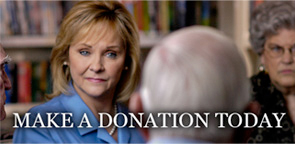Getting the Job Done - A Record of Leadership
State Representative
First elected to the Oklahoma House of Representatives in 1990, Mary Fallin has had a long career of public service focusing on conservative, commonsense solutions to the challenges our families and businesses face.
As a state legislator, Mary worked in the Republican minority to forge relationships across the aisle and find common ground with the Democratic majority. Mary crafted the state's first "stalker law," which made it a misdemeanor on the first offense to follow or threaten a person maliciously, and a felony on the second. The bill was one of the first state bills in a nationwide attempt to prevent rapes and was signed into law by Democratic Governor David Walters.
Mary also worked in the Oklahoma House to pass a small-business insurance reform act, helping employers acquire and keep affordable health insurance for their employees. Since then, she has continued to work for smart, affordable, free-market reforms to lower health care costs, while leading the charge against the kind of big-government plans proposed by the Clintons in the 90s and President Obama today. For her leadership and work in the area of health care as a state representative, Mary was honored as a "Legislator of the Year" by the American Legislative Exchange Council.
During her time as a state representative, Mary would eventually pass more than a dozen bills. In addition to the stalker law, she worked with both parties to produce commonsense legislation, like her bill banning smoking in daycare centers.
Lieutenant Governor
As the state's first woman and first Republican lieutenant governor, Mary focused on issues affecting job creation and economic growth. She served on 10 boards or commissions involving business and quality-of-life issues in Oklahoma, including the State Board of Equalization, the Tourism and Recreation Commission and the Oklahoma Land Commission. Mary also created or helped to create numerous economic events and job symposiums, such as the first ever Oklahoma Aerospace Summit and Expo, Telecommunications Day at the Capitol and Small Business Day at the Capitol.
She later took on the issue of skyrocketing costs of legal fees and workers' compensation costs that stifle job growth and business expansion. In January 1997, the Fallin Commission on Workers' Compensation released a 57-page, comprehensive reform bill that would lower costs and create a workers' compensation system that was fair to both businesses and workers.
Mary also challenged the state's union bosses, using her position as president of the Oklahoma State Senate to force a dramatic showdown on "Right to Work," which ended the practice of compelling workers to join and pay dues to a union. In 2001, Oklahoma became the first state in the country to pass such a law in more than 25 years. The law is credited for helping to make the state friendlier to job growth and business development.
U.S. Congress
Mary was elected to Congress in 2006, and since then has served on the committees for small business, transportation and infrastructure, natural resources and armed services.
As a congresswoman, Mary has coauthored numerous pieces of legislation (click here for a list from the 110th Congress and click here for a list from the 111th Congress) that would lower taxes, reduce regulation on businesses and individuals, fight federal overreach, increase American energy production, create jobs and protect constitutional liberties.
She has also served as the primary author of legislation that would reorganize and create more efficiencies in Small Business Administration programs designed to help women entrepreneurs, prohibit the transfer of terrorist detainees from Guantanamo Bay, and expedite the leasing process for the drilling and exploration of oil and natural gas (for more bills authored by Fallin in the 110th Congress click here and for a list from the 111th Congress click here). Mary also won praise from the mayor and people of Edmond for resolving a debt dispute with the federal government that would have cost the city more than $11 million.
Mary has been recognized by numerous conservative groups for her defense of free enterprise and family values. A recent edition of the National Journal ranked her voting record as the most conservative among the Oklahoma House delegation.



